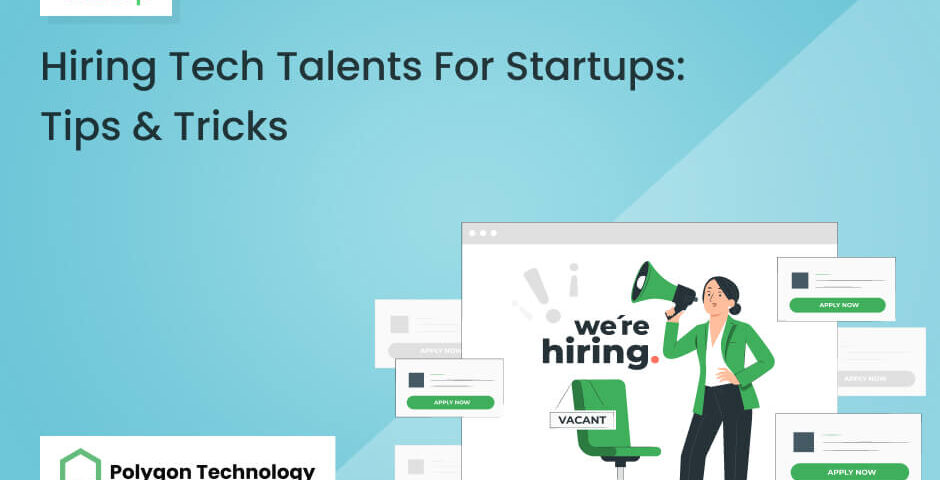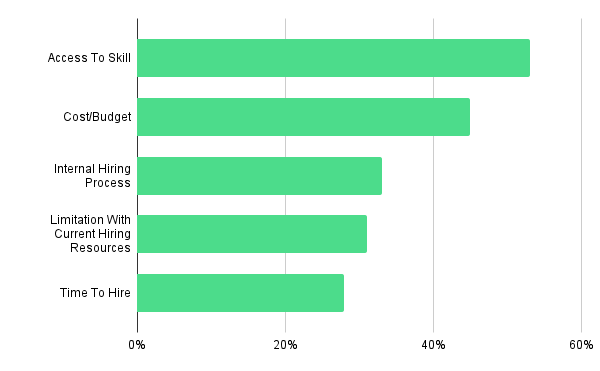
Hiring Tech Talents For Startups: Tips & Tricks
Hiring Tech Talents For Startups: Tips & Tricks

In the dynamic landscape of startups, hiring the right tech talent for startups can make or break your success. Skilled and passionate tech professionals are the driving force behind innovation, growth, and business success. But, attracting these individuals to your startup can be an uphill battle. In this blog post, we’ll explore the crucial importance of hiring the right tech talents, discuss the challenges associated with it, and provide you with the right tips and tricks to ensure successful recruitment.
The Importance of Hiring The Right Tech Talent
Fueling innovation
Innovation is the lifeblood of startups. Its innovation that enables them to disrupt well-established industries. Hiring the right tech talents injects them with innovation, creativity, and out-of-the-box thinking. These professionals can break the barrier, push boundaries and bring ideas to reality. Keeping your startup ahead of the competition.
Accelerating Growth
Hiring the right tech professionals for the right tasks enables you rapidly to scale. They understand how to optimize processes, enhance efficiency and drive growth through technology. You can build a strong foundation for sustainable growth.
Navigating Complexity
The startup landscape is filled with challenges. This includes complex technology, changing market trends, and so on. Hiring talented tech professionals equips you with the resources to navigate these complexities. As they are adept at facing challenges head-on, finding solutions, and adapting to changes as they arise.
Saving Money
If you are not careful technology can drain huge chunks of your budget. Especially if you are a non-technical founder, you need to be extra careful. Hiring the right resources can help save unexpected costs.
Retaining Talent
If you want to attract and keep the top tech talents you need to have the right talent in your team. They’ll guide, motivate and retain the newcomers in your company. When you have the top tech talent working for your startup you can create a positive feedback loop. This will results in bringing more great tech professionals to your startup.
Understanding Startup Landscape: Overview of the Tech Talent Shortage
The tech talent shortage is a prevalent challenge faced by startups and established companies alike. Around 9.6 million jobs opened up in March 2023 in the USA alone. The rapid growth of the industry has created a demand for skilled professionals. And, it surpasses the available supply. This shortage is further exacerbated by the continuous emergence of new technologies. Which created a broader need for specialized expertise. As a startup, it’s a must to be aware of this shortage and develop strategies to attract and retain them.
Identifying Specific Tech Roles Needed for Your Startup
To hire the right tech talent, it is crucial to identify the specific roles your startup requires. Consider the following steps:
Analyze Your Technological Needs
Test your startup’s technical requirements. This should be based on your product/service offerings, development roadmap, and long-term goals.
Understand The Required Skill Sets
Identify the essential technical skills, programming languages, frameworks, and tools required for each role.
Prioritize Roles
Determine which tech roles are critical to your startup’s immediate and long-term success. Focus on roles that most align with your product/service development.
Consider Skill Gaps
Identify any skill gaps within your existing team and prioritize roles that can address those gaps.
Flexibility and Versatility
In the early stages, consider hiring versatile tech professionals who can wear multiple hats and adapt to evolving needs.
Seek Specialization As You Grow
As your startup matures, consider hiring specialists. Who can bring in-depth expertise in specific areas to drive growth and innovation.
The Challenges Faced By Startups In Hiring Tech Talents
According to inervo’s report the following chart visualizes the challenges hiring managers face while hiring –

Let’s dive deep into these challenges recruiters face with recruitment –
Limited Resources
Startups typically have limited financial resources. Making it difficult to compete with established companies in terms of compensation packages. Attracting top tech talents may be challenging when larger companies can offer higher salaries, better benefits, and more stability.
Competition from Established Companies
Established tech companies often have a competitive advantage. They have well-established recruitment processes, established networks, and extensive resources. Startups may find it challenging to persuade tech professionals to choose them instead.
Brand Recognition
Startups may struggle with brand recognition. Particularly if they are in the early stages of development. Candidates often prefer to work for well-known companies. Building a strong employer brand and showcasing the unique opportunities and growth potential at the startup can help overcome this challenge.
Specific Skill Requirements
Startups often have specialized skill requirements due to their unique products or technologies. Finding candidates with the right combination of skills and experience can be challenging. Especially when the demand for certain skills exceeds the available talent pool. 53% of hiring managers agree that skills have become more specialized. Startups may need to consider alternative strategies such as providing training opportunities or partnering with educational institutions to bridge the skill gap.
Uncertainty and Risk
Some candidate think joining startups is risky. As startups are associated with higher levels of uncertainty compared to established companies. Candidates may be hesitant to leave a stable job for a startup. That’s why its crucial to communicate the vision, potential for growth, and opportunities for personal and professional development to mitigate these concerns.
Speed of Hiring
Startups often need to hire tech talents quickly to meet their growth demands. However, the hiring process can be time-consuming, involving multiple stages, interviews, and evaluations. Balancing the need for a thorough evaluation of candidates with the urgency to fill positions can be a significant challenge for startups.
Cultural Fit
Startups have a unique culture and work environment. Which is characterized by innovation, flexibility, and a fast-paced nature. However, finding candidates who align with the startup’s culture can be difficult. As they need to be comfortable with the challenges and ambiguity that come with working in a startup.
Addressing The Hiring Issues: Tips To Hire Tech Talents For Startups
To address these issues, there are a few strategies that startups can employ.
Challenges and Tips for Building a startup Tech Team
Here are a few challenges startups face when building a tech team —
1. Firstly, startups can utilize cultural fit assessments to identify candidates who align with their values and work environment. These assessments can help evaluate whether a candidate possesses the necessary mindset and adaptability to thrive in a startup setting.
2. Secondly, Startups should effectively communicate their values and work environment. By clearly expressing, startups can attract individuals who resonate with their vision and are excited about the unique challenges and opportunities.
2. Startups can also leverage their strengths to attract top talent. One way to do this is by offering equity or stock options. Which can provide employees with a sense of ownership. Startups should highlight the opportunities for learning and growth within the organization. Also the impact that employees can have in a smaller, more agile company.
3. Building a strong network is another effective strategy for attracting top talent. Startups can actively engage with tech communities and educational institutions, attend events, sponsoring hackathons, and participating in industry conferences. By doing so, startups can increase their visibility and establish relationships with talented individuals. This will increase the chances of making talented individuals interested in joining startups.
4. Leveraging staff augmentation can also help reduce some of the hiring challenges that startups face. This way startups can mitigate the cost, liability while also ensuring specialized talents in the pool.
5. Finally, optimizing the hiring process for efficiency is crucial. Startups should streamline their recruitment process. They need to ensure it’s quick and responsive to avoid losing candidates to competitors. Providing timely feedback and maintaining open lines of communication with candidates can also make a significant difference in attracting and retaining talents.
What world Class Entrepreneur Say About The Challenges Associated With Tech Hiring
Elon Musk (Tesla, SpaceX)
“Hiring great engineers is always a major challenge. It’s important to find people who are not only technically skilled but also have a strong sense of mission and are excited about what they’re doing.”
Key takeaway: Look for candidates who not only possess technical expertise but also align with your company’s mission and show a genuine passion for the work.
Sheryl Sandberg (Facebook)
“One of the biggest challenges in hiring engineers is the intense competition for top talent. To attract the best, you need to showcase your company’s unique culture, provide growth opportunities, and offer compelling projects.”
Key takeaway: Differentiate your company by highlighting its unique culture, growth prospects, and exciting projects to stand out and attract highly sought-after tech professionals.
Jeff Bezos (Amazon)
“It’s important to prioritize hiring for the long term. Rather than settling for quick fixes, focus on finding individuals with a strong learning mindset and the ability to adapt to new technologies.”
Key takeaway: Look for candidates who exhibit a growth mindset and are adaptable to evolving technologies. Prioritize long-term potential over short-term solutions.
Drew Houston (Dropbox)
“Building a great engineering team requires a relentless pursuit of talent. Actively seek out the best engineers, even if they’re not actively looking for new opportunities. Top talent can significantly elevate your company’s capabilities.”
Key takeaway: Don’t wait for candidates to come to you; proactively search for the best talent in the market, even if they’re not actively job hunting.
Marissa Mayer (former CEO of Yahoo)
“Hiring the right people is crucial for success. Look for candidates who not only possess technical skills but also have a strong track record of learning and adapting to new challenges.”
Key takeaway: Prioritize candidates who demonstrate a history of continuous learning and the ability to tackle new challenges, as these traits are vital in the fast-paced tech industry.
Mark Zuckerberg (Facebook)
“One of the biggest challenges in hiring tech professionals is evaluating their potential. It’s not just about what they know today but also about their ability to learn and grow over time.”
Key takeaway: Assess candidates’ potential for growth and their ability to acquire new skills, as this is crucial in a rapidly evolving tech landscape.
Wrapping up
In summary, successful entrepreneurs emphasize the importance of finding tech professionals who align with the company’s mission, possess a growth mindset, and demonstrate the ability to adapt. Actively seeking top talent, showcasing unique company culture, and prioritizing long-term potential are strategies commonly employed to overcome the challenges of hiring tech professionals.